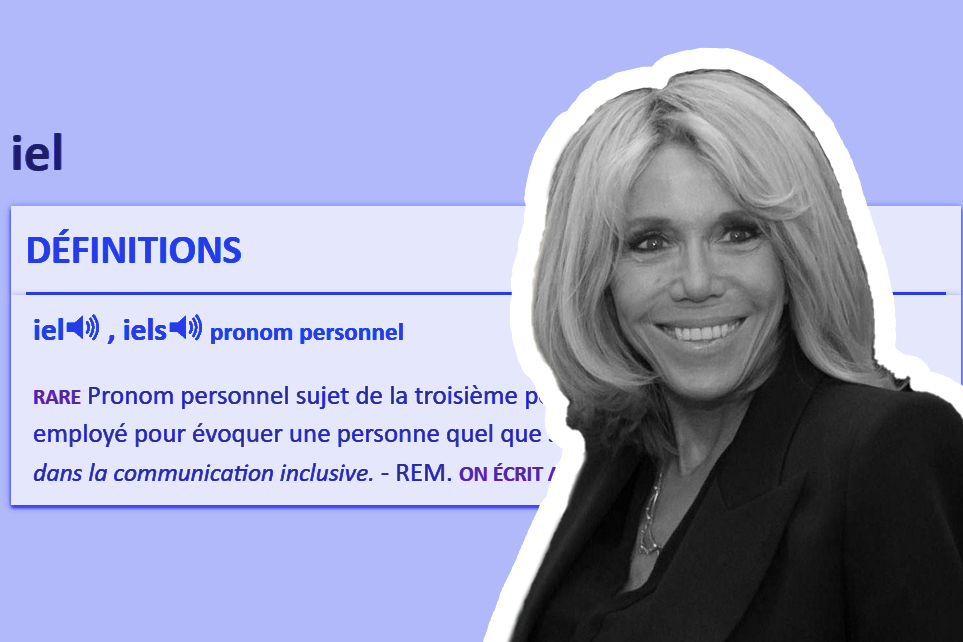
French First Lady Brigitte Macron voices disapproval over dictionary addition of gender-neutral pronoun ‘iel’
Brigitte Macron, First Lady of France and former French language teacher, was not pleased with the recent addition of the gender-neutral pronoun ‘iel’ to Le Petit Robert, a prominent French dictionary. She firmly states that the French language only has two pronouns for gender: ‘he’ and ‘she’ respectively.
Several figures in the French government have put themselves behind Macron, supporting her view. Education Minister Jean-Michel Blanquer of La République En Marche! echoed her sentiment and said in his own statement that the French language should not be manipulated, no matter the cause. Francois Jolivet, also a member of the same party, took to Twitter to voice his criticism as well. He called the move a worrying sign of ‘woke’ ideology.
Regardless, not everyone in the French government sees this move as an attack on French culture. Élisabeth Moreno, Minister Delegate for Gender Equality, Diversity and Equal Opportunities, does not find this a shocking development. ‘This is progress for those who resonate with this pronoun’, she told Le Monde in an interview. ‘I don’t see what it takes away from those who do not.’
By popular demand
Le Petit Robert published a press release on their website, elaborating that the addition was not politically motivated or part of any ‘woke’ movement. In it, Managing Director Charles Bimbenet states that the choice was made in response to the rising popularity of the word in spoken language. ‘It seemed useful to us to specify its meaning for those who come across it, whether they wish to use it or not – or reject it completely.’
A matter of language and politics
Karen Lahousse, linguist at KULeuven, explains why this word seems to cause more debate than previous dictionary additions. ‘There are two main factors that make this a special case. Firstly, there is the linguistic side of things. Pronouns are what we call a ‘closed’ group of words. Nouns and adjectives on the other hand are an ‘open’ word group. They are more easily described and added because they are simpler to define and have less of a grammatical impact on a language.’
When, then, is a word considered a good candidate to be added to the lexicon? ‘Even linguists are often divided on the topic but generally we observe what is being used, how frequently and how widely spread, and try to reflect that accurately’, says Lahousse. ‘Le Petit Robert has said this in their statement as well. I have personally not seen any research on the usage of this new pronoun and how widely it is used, but I am not against it being added.’
Le Petit Robert, dictionnaire que l’on pensait être une référence, vient d’intégrer sur son site les mots « iel, ielle, iels, ielles ». Ses auteurs sont donc les militants d’une cause qui n’a rien de Français : le #wokisme. J’ai écrit à l’Académie française. #LePetitRobert pic.twitter.com/ixFIP7s0It
— François Jolivet (@FJolivet36) November 16, 2021
‘Another influence is of course politics. While Francois Jolivet might be a fairly Liberal politician, he is also part of an ‘anti-woke’ lobbyist group. It’s not surprising that he took a clear stance against this. Additionally, L’Academie Française, the principal French council for matters pertaining to the French language, runs a tight ship when it comes to amendments made to the language.’
Regardless of political and linguistic stances, several people on Twitter have applauded Le Petit Robert for making this move.
Text: Leïlani Duroyaume, final edit: Andrei Stiru
Collage: Leïlani Duroyaume, photo: Presidencia de la República Mexicana (CC BY 2.0)



